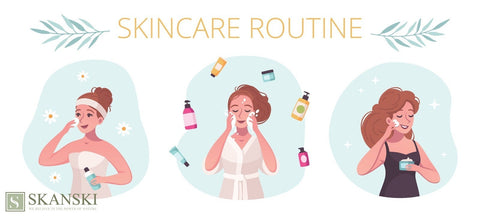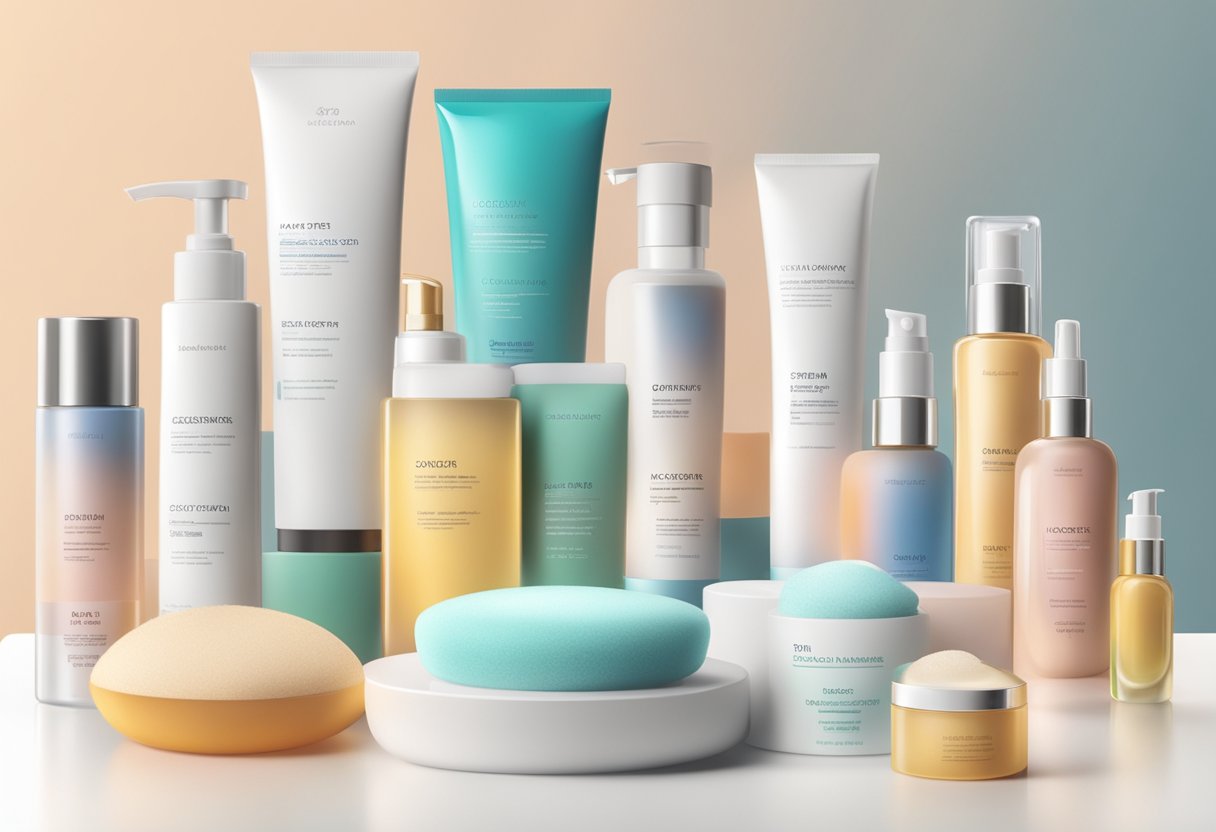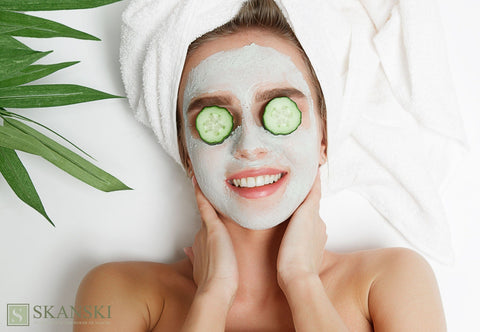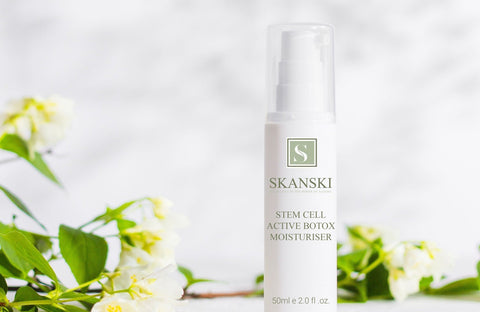Mastering Steps for Glowing Skin
A skincare routine is an essential component of daily self-care, helping you maintain healthy, radiant skin. With so many products available, it can be confusing to determine the correct order to apply them to achieve the best results. Understanding the proper skincare routine order not only ensures the effectiveness of each product but also prevents potential adverse reactions that may arise from layering incompatible ingredients.

Different skin types, such as oily, dry, sensitive, or acne-prone, require specific products and care routines tailored to their unique needs. To develop an effective skincare regimen, it is crucial to recognize the role of each product, such as cleansers, toners, serums, moisturizers, and sunscreens, and how they benefit your skin. Additionally, consulting a dermatologist or skincare professional can provide personalized advice and answer frequently asked questions to help you achieve your skincare goals.
Key Takeaways
- Establishing the correct order for a skincare routine enhances product effectiveness and prevents potential issues.
- Different skin types require unique products and routines, tailored to address specific skincare concerns.
- Consultation with a skincare professional can provide personalized advice for achieving optimal skin health.
Understanding Skin Types

When it comes to skincare, it's essential to understand that everyone's skin is unique. However, for simplicity, dermatologists categorize skin into various types. Recognizing your skin type will help you choose the right products and create an effective skincare routine. Let's briefly discuss the common skin types: dry, oily, sensitive, acne-prone, and combination skin.
Dry skin is a result of low levels of sebum, or natural oil production. This skin type may feel tight, display flakes, and be prone to fine lines and wrinkles. It's crucial for individuals with dry skin to use gentle, moisturizing products that won't strip away the remaining moisture in their skin. Regular exfoliation can also help remove dead skin cells and promote a healthy glow. Consider checking out moisturizers for dry skin.
On the other hand, oily skin implies excessive sebum production and can lead to a shiny or greasy appearance, clogged pores, and acne. People with oily skin should focus on using oil-free, non-comedogenic products that help balance sebum production without clogging the pores. Additionally, incorporating a clay mask into the routine can aid in absorbing excess oils.
Sensitive skin may react adversely to certain chemicals or fragrances in skincare products. So if you have sensitive skin, it’s essential to look for gentle, hypoallergenic products formulated specifically for this skin type. Patch testing a new product is also a good idea, as it can help identify potential sensitivities before applying it to the entire face.
Individuals with acne-prone skin often experience frequent breakouts and inflammation. This skin type can be tricky to manage, but using non-irritating, acne-safe products and incorporating salicylic acid or benzoyl peroxide as active ingredients can help control breakouts. Here's a list of effective acne treatments you might find useful.
Finally, combination skin is a mix of both oily and dry skin, usually with an oily T-zone (forehead, nose, and chin) and dry cheeks. People with combination skin should focus on balancing their skincare routine, using gentle cleansers and moisturizers, while targeting the oily areas with oil-absorbing products or treatments.
Remember that understanding your skin type is the first step to achieving healthy, glowing skin. It allows you to select the most suitable products and tailor your skincare routine, leading to better results and happier skin.
Essential Skincare Components

A proper skincare routine is crucial to maintaining healthy and radiant skin. In this section, we will discuss some essential components that make up an effective skincare routine.
Cleansing is the foundation of any skincare routine. It is essential to start with a cleanser to remove dirt, makeup, and excess oil from the skin's surface. There are numerous cleansers available to suit different skin types, so it's vital to find the one that works best for your skin. It's important to use warm water when cleansing, as hot water can overstrip the skin, leading to a weakened skin barrier.
An interesting technique gaining popularity is double cleansing. This method involves using an oil-based cleanser, followed by a water-based cleanser. The oil-based cleanser dissolves and removes oils produced by your skin, while the water-based cleanser eliminates sweat, dirt, and residual skincare products left behind. Double cleansing ensures that your skin is genuinely clean and ready for the next steps in your skincare routine.
Maintaining a balanced and healthy skin barrier is essential for overall skin health. The skin barrier serves as a protective layer against environmental irritants and damaging substances. A crucial step in any skincare routine is moisturizing to keep this barrier healthy and hydrated.
Using a suitable face wash is another essential aspect of a skincare routine. A gentle, sulfate-free face wash that doesn't contain fragrances can be used twice a day to cleanse and refresh the skin. Be careful not to over-cleanse, as this can lead to dryness and irritation.
In conclusion, proper cleansing, choosing the right cleanser and face wash, double cleansing, and maintaining a healthy skin barrier are all crucial components of an effective skincare routine. Incorporating these steps into your daily regimen will help you achieve and maintain healthy, glowing skin.
The Correct Skincare Routine Order
A skincare routine is essential for maintaining healthy skin. To achieve the best results, it is crucial to apply the products in the correct order. Layering products from the thinnest to the thickest consistency allows each product to be absorbed optimally. Here is a friendly guide to help with the proper layering of your skincare products.
-
Cleanse: Start with a clean canvas by using an oil-based or water-based cleanser. This step helps to remove makeup, excess oil, and dirt from the skin's surface. According to Healthline, oil-based cleansers are suitable for dissolving skin oils.
-
Tone: After cleansing, apply a toner to balance the skin's pH levels and prepare it for the subsequent steps. Toners can also help remove any residual dirt and makeup that the cleanser might have missed.
-
Serum: Serums are packed with active ingredients that target specific skin concerns like wrinkles, dark spots, or dehydration. Choose a serum with ingredients that address your skin issues, and gently pat it onto the skin.
-
Moisturizer: Seal in the skin's hydration by applying a moisturizer suitable for your skin type. Oily skin types may prefer lightweight, water-based moisturizers, while dry skin types might opt for thicker, creamier formulations.
-
Sunscreen (morning only): Protect your skin from harmful UV rays by applying a broad-spectrum sunscreen with at least SPF 30. The Cleveland clinic recommended applying sunscreen last in the morning routine.
-
Oil (optional): If your skin needs extra nourishment, you can layer a facial oil on top of your moisturizer. Oils can provide additional hydration and help lock in moisture.
Following this layering technique ensures that each product can effectively work on the skin. Remember that skin is unique, and it might take some trial and error to find the perfect combination of products for your individual needs. However, with consistency and patience, you'll be on your way to achieving healthy, glowing skin.
Role of Each Skincare Product
Cleansers and Face Wash
Cleansers are essential in removing surface dirt, bacteria, and makeup from the skin. A gentle face wash can effectively clear away impurities without causing irritation. Cleansing prevents clogged pores and helps maintain skin health.
Toners
Toners play an important role in tightening pores and balancing the skin's pH levels. They can be useful for those with oily skin or large pores, and can help remove any residue left behind after cleansing. Some toners are hydrating, while others may contain ingredients like salicylic acid or glycolic acid, which are exfoliants.
Serums
Serums are lightweight and packed with active ingredients. They can address specific concerns, such as aging, hyperpigmentation, or hydration. Popular serums include vitamin C serum for its antioxidant properties and retinol serum for treating fine lines and wrinkles.
Moisturizers
Moisturizers help lock in hydration and keep the skin barrier healthy. They are available in various forms, such as creams, lotions, and gels. Choose a moisturizer based on your skin type and personal preferences. Some moisturizers also contain hydrating ingredients like hyaluronic acid and glycerin to provide extra moisture.
Sunscreen
Sunscreen is a crucial skincare product that should be applied daily. It protects the skin from harmful UV rays, preventing sunburn and premature aging. Use a sunscreen with an SPF of at least 30, and opt for a mineral sunscreen if you have sensitive skin.
Special Skincare Products
Eye creams, masks, and makeup removers are examples of special skincare products. Eye creams target the delicate skin around the eyes and can help reduce puffiness, dark circles, and fine lines. Face masks can also provide a deep-treatment to address specific concerns. Makeup removers efficiently eliminate makeup while being gentle on the skin.
Retinoid and Exfoliants
Retinoid, a derivative of vitamin A, helps improve skin texture, treat acne, and reduce the signs of aging. Some retinoids require a prescription, while others like retinol, are available over-the-counter.
Exfoliants, such as beta hydroxy acid (BHA) and salicylic acid, help slough away dead skin cells, promoting skin cell turnover. They can also address concerns like acne, hyperpigmentation, and fine lines. However, it is essential to use them sparingly, as over-exfoliating can cause skin irritation.
Skincare Ingredients and Their Benefits

When it comes to building an effective skincare routine, understanding the benefits of various ingredients can be helpful. In this section, we'll briefly discuss some popular skincare ingredients and their unique properties that contribute to healthier, more vibrant skin.
Hyaluronic acid is a naturally occurring substance in our body that helps to retain moisture. In skincare products, hyaluronic acid attracts and holds water, making it an excellent choice for hydrating and plumping the skin.
Antioxidants are essential for fighting free radicals that can damage our skin cells. These molecules help to neutralize and prevent cellular damage, reducing the signs of aging and promoting overall skin health. Examples of antioxidants commonly found in skincare include vitamin C, vitamin E, and green tea extract.
- Ceramides are lipid molecules that help to maintain the skin's barrier, playing a crucial role in retaining moisture and preventing irritants from entering the skin. Incorporating ceramides into your skincare routine can lead to smoother, more hydrated skin.
- Niacinamide, also known as vitamin B3, is a powerful skincare ingredient that improves the skin's barrier function, helps to reduce inflammation, and brightens the complexion. It's also known to minimize the appearance of pores and fine lines.
Lastly, glycerin is a humectant that attracts water to the skin, helping to maintain hydration and reduce dryness. It's a common ingredient in skincare products due to its moisturizing properties and gentle nature.
In conclusion, the judicious use of these active ingredients in your skincare routine can help achieve a healthy, radiant complexion. Remember to pay attention to the specific benefits each ingredient offers and adjust your regimen accordingly.
Skincare for Different Concerns

Taking care of your skin is essential, and everyone's skin is unique, with different needs and concerns. Here are some skincare solutions for common skin concerns:
Irritation & Inflammation: Choose gentle, soothing products that contain calming ingredients such as chamomile or aloe vera. Avoid harsh, abrasive scrubs, and alcohols, which can further irritate the skin.
Acne & breakouts: An effective skincare routine can help prevent acne and breakouts. Incorporate a cleanser to remove dirt and excess oil. Look for ingredients like salicylic acid or benzoyl peroxide for spot treatments of active breakouts.
Fine Lines & Wrinkles: To address fine lines and wrinkles, search for products with antioxidants and moisturizers. Ingredients like retinol, vitamin C, and peptides can help stimulate collagen production and improve skin texture.
Dark Circles: Tackle dark circles and eye puffiness with products that contain caffeine, hyaluronic acid, or niacinamide. Eye creams specifically formulated for the delicate skin around the eyes are the best.
Texture: Improve your skin's texture by using products that promote cell turnover. Chemical exfoliants with glycolic, lactic, or salicylic acid can be a helpful addition to your routine. Remember not to over-exfoliate, though, to avoid irritation.
Here's an overview of recommended ingredients for common skin concerns:
| Skin Concern | Ingredients |
|---|---|
| Irritation | Chamomile, aloe vera |
| Acne & Breakouts | Salicylic acid, benzoyl peroxide |
| Fine Lines & Wrinkles | Retinol, vitamin C, peptides |
| Dark Circles | Caffeine, hyaluronic acid, niacinamide |
| Texture | Glycolic acid, lactic acid, salicylic acid |
Keep in mind that patience and consistency are key when incorporating new products into your routine. It takes time for the skin to adjust and show results. Be patient and gentle with your skin, and remember to always patch test new products to avoid potential irritation or allergies.
Professional Advice on Skincare
Dermatologists are specialized doctors who focus on treating various skin-related problems. When it comes to crafting an effective skincare routine, a board-certified dermatologist can offer valuable advice for achieving healthy, radiant skin.
The first step in a skincare routine is cleansing. A good quality cleanser helps remove makeup, dirt, and impurities from your skin. It's crucial to cleanse both in the morning and the evening. Morning cleansing is necessary to get rid of the oil accumulated overnight, while evening cleansing ensures the removal of dirt and makeup from the day.
After cleansing, a toner can be applied, although it's an optional step. If you choose to include a toner in your routine, make sure to apply it on clean skin just after cleansing. Toners have evolved significantly in recent years, becoming gentler and more beneficial for the skin.
Here's a quick, simplified example of a suggested skincare routine order:
- Cleanser
- Toner (optional)
- Serum or treatment product
- Moisturizer
- Sunscreen (for morning routine)
Furthermore, it's essential to tailor your skincare routine to your skin type and its specific needs. Factors like age, lifestyle, climate, and personal preferences play a significant role in determining the appropriate products and their respective orders. Consulting a board-certified dermatologist is always the best approach to finding the right skincare routine for you.
In conclusion, a carefully structured skincare routine can make a world of difference in achieving a healthy complexion. Taking into account professional advice from a dermatologist ensures that you're using the most suitable products and applying them in the correct order for optimal results.
Frequently Asked Questions
What is the proper sequence of steps in a daily skincare routine?
A daily skincare routine typically follows this order:
- Cleanser
- Toner
- Serums and spot treatments
- Moisturizer
- Sunscreen source
This sequence helps with the proper absorption of each product and ensures maximum effectiveness for your skin.
How do I create a beginner's skincare routine?
For a beginner's skincare routine, start with these three essential steps:
- Cleanser - to remove dirt, oil, and makeup.
- Moisturizer - to hydrate and nourish the skin.
- Sunscreen - to protect the skin from harmful UV rays. As you become more familiar with your skin's needs, you can incorporate additional products like toners, serums, and exfoliants.
What are the essential skincare products for a daily routine?
The essential skincare products for a daily routine include a cleanser, moisturizer, and sunscreen . Additional products like toners, serums, and exfoliants can be added to address specific skin concerns.
How does the skincare routine order change for dry skin?
For dry skin types, a thicker, cream-based cleanser may be used for a more hydrating experience. The use of a hydrating serum before the moisturizer can also increase the hydration level.
What are the differences between Korean skincare routine orders and others?
Korean skincare routines frequently have more steps than Western routines, such as using an oil-based cleanser then a water-based cleanser (double cleansing), essence, sheet masks, and eye creams. The focus is on layering lightweight, hydrating products for optimal skin health.
Can exfoliation be incorporated into a standard skincare routine?
Yes, exfoliation can be incorporated into a standard skincare routine. However, it should be done carefully and at the appropriate frequency based on your skin type and tolerance level to avoid irritation. Physical exfoliants, like scrubs, can be used once or twice a week, while chemical exfoliants, like alpha hydroxy acids (AHAs) or beta-hydroxy acids (BHAs), can be used anywhere from daily to a few times a week, depending on the product's strength and your skin's needs.




